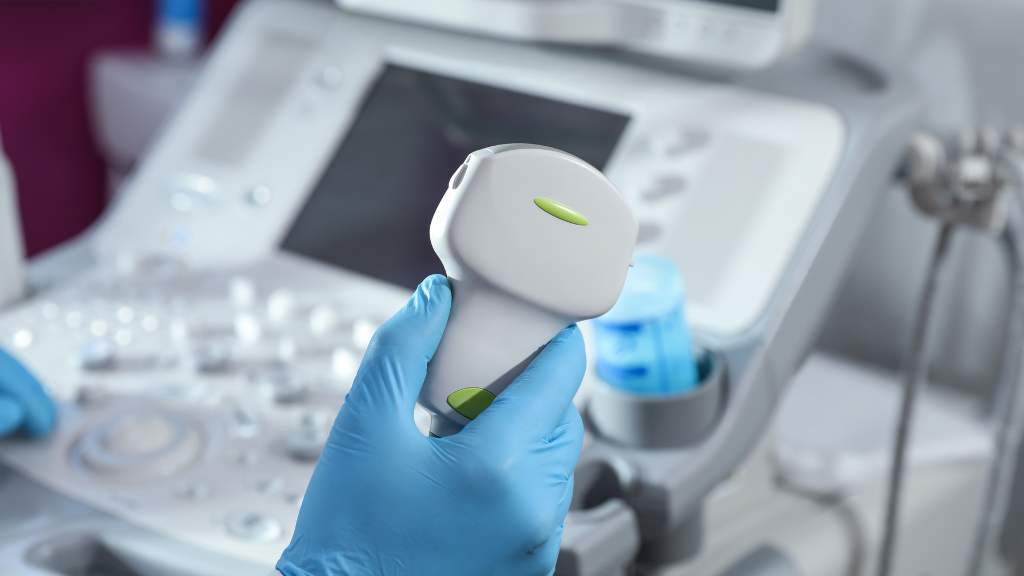Breanne has worked in the Ultrasound Department at St. Boniface Hospital for more than a decade and employed in the health-care sector for over twenty years. As Charge Sonographer, she keeps her team safe, ensures the quality of their diagnostic scans, and makes patients the centre of everything they do.
“I truly have the best team,” Breanne says. “It’s a privilege to provide high-quality ultrasound for every patient I encounter and to support my colleagues in doing the same.”
Her health-care career began immediately after high school as an ultrasound clerk, a role that revealed both the challenges of the system and her desire to make a difference. While completing a Bachelor of Science in Human and Integrative Physiology, Breanne also worked as a paramedic, which reshaped her perspective on risk and the realities of the health-care system.
Ultimately, she chose to specialize in sonography. She loved that it allowed her to use both her hands and mind to solve real-time diagnostic puzzles.
“The diagnosis is in our hands,” she says, referring to a quote from Dr. John C. Hobbins. “If we don’t point the sound beam at the right area, ask the right questions to uncover subtle signs of pathology, the radiologist might never know it’s there.”
Over the past 11 years at St. Boniface, Breanne says several experiences have affirmed she is exactly where she needs to be – not only in the right career, but also part of the right team.
Once, a patient arrived frustrated after experiencing vague symptoms and undergoing a series of inconclusive tests. Breanne noticed a slight abnormality that required further investigation.
“My colleagues saw I was on to something and were able to seamlessly absorb my other patients for the day, which allowed me to focus on my patient without having to rush, skip breaks, or stay late.”
The extra time allowed her to document the findings thoroughly before bringing them to the radiologist, leading to an accurate diagnosis and effective treatment plan.
“That experience showed me we’re not just individual operators, but a true diagnostic team. Together, we can override challenges and change a patient’s life.”

In a busy department that performs nearly 3,000 scans each month, Breanne says it’s a delicate balance to provide quality care amid high volumes of patients. When exams become unexpectedly complex, the team finds a way to maintain diagnostic quality without rushing, which could risk missing important details. They work collaboratively to problem-solve, either by adjusting the schedule, rearranging tasks, or re-booking less urgent appointments.
“The health-care system has immense pressure to solve wait times. But as a sonographer, my responsibility is to support the patient in front of me. I’m not just advocating for my single patient; I’m helping the whole team uphold our standard of care under pressure.”
For current students or those considering a career in sonography, Breanne suggests they establish their why.
“While Ultrasound is incredibly rewarding, it will challenge you in every way possible. You’ll need a strong sense of purpose to sustain you.”
She highlights three realities of the profession:
- It’s physically demanding, with high rates of career-altering injuries. Advocating for your own health and safety is non-negotiable.
- It demands intense focus. Sonographers are diagnostic detectives hunting for clues in real-time. The responsibility of finding (or missing) something critical is a heavy burden to shoulder.
- It requires deep emotional resilience. Sonographers must be able to provide compassionate care during some of the most joyful and most devastating moments in a person’s life.
But in return?
“You’ll be the person with the crucial answer the care team needs. You will be among the first to see new life forming, discover a life-altering diagnosis, and guide patients through some of their most vulnerable moments. Your why will inspire moments of discovery and connection, and more importantly, will get you through the tough days.

